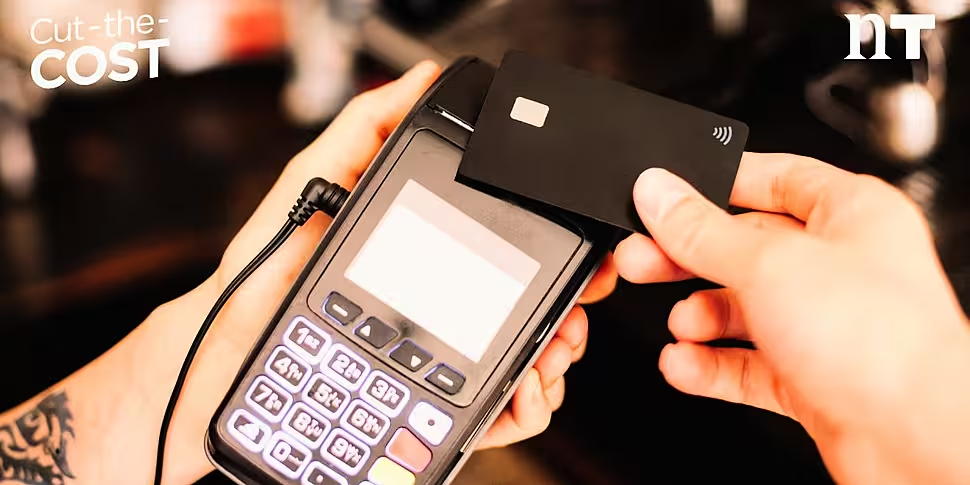Overdraft fees and ATM withdrawals can all add up with your day-to-day banking - but are you with the right bank for your needs?
As the cost-of-living crisis continues to bite, Newstalk is here to show you the best ways to save on your bills.
Cut-the-Cost offers tips and advice on everything from your phone bill to broadband, streaming services and even your weekly shop.
This week we're taking a deep dive into the world of banking, to see exactly what it costs you and where you could save.
The landscape has changed in recent years, with the departure of KBC and Ulster Bank and the arrival of virtual banks like Revolut and N26.
Let's crunch the numbers for main current accounts and see who gives you what.

AIB
Account charge: €4.50 per quarter
Automated Transactions (incl debit card purchases, standing orders and direct debits): €0.20 each
Overdraft set-up: €25.39
ATM withdrawal fee: €0.35
An Post
Account charge: €5 p/m
Overdraft set-up: N/A
ATM withdrawal fee: €0.60
Post office lodgement by cash, debit card or cheque: €0.50
Bank of Ireland
Account charge: €6 p/m
Overdraft set-up: €30
ATM withdrawal fee: Free (subject to Government Stamp Duty)
bunq
Account charge: From €2.99 p/m
Overdraft set-up: N/A
ATM withdrawal fee: €0.99 for first five p/m, €2.99 for more than five
Credit Union
Account charge: €4 p/m
Overdraft set-up: €25
ATM withdrawal fee: Five free p/m, with a €0.50 per transaction charge after that
EBS
Account charge: Free
Overdraft set-up: N/A
Unauthorised overdraft: €5
ATM withdrawal fee: Free (subject to Government Stamp Duty)
N26
Account charge: Free
Overdraft set-up: N/A
ATM withdrawal fee: Three free p/m. A charge of €2 applies to each withdrawal beyond this limit
PTSB
Account charge: €6 p/m
Overdraft set-up: €25 per year
ATM withdrawal fee: Free (subject to Government Stamp Duty)
Revolut
Account charge: Free
Overdraft set-up: N/A
ATM withdrawal fee: Up to €200 p/m
Revolut is increasing the charges on its paid plans in Ireland.
The cost of its Plus product is to rise by €1 a month to €3.99, and its Premium product is also increasing by €1 a month to €8.99.
Revolut Metal is also to climb by €2 a month to €15.99.
The company has said its free product will remain free and the price of its Ultra package will also stay the same.
 A credit card is seen with €100 banknotes in this 2021 file photo. Image: Maryia Kazlouskaya / Alamy Stock Photo
A credit card is seen with €100 banknotes in this 2021 file photo. Image: Maryia Kazlouskaya / Alamy Stock PhotoEven if ATM withdrawals are free with an account, the Government charges Stamp Duty at a rate of €0.12 per ATM transaction.
The stamp duty only applies to ATM transactions carried out within Ireland and is due to be paid yearly.
This charge is capped at €2.50 per year if you use your debit card for ATM transactions only, and capped at €5 if you use your debit card for both ATM transactions and purchases.
All current account providers charge interest if you use an overdraft.
These rates vary but currently range between 11.85% and 15.55% for an arranged overdraft, and 11.85% and 27% for an unauthorised one.
Switching your account
There is lots of help out there for people looking to switch accounts.
The Central Bank Switching Code ensures switches have to be completed by the bank within 10 working days.
This includes the transfer of all direct debits and standing orders.
Those swiching are advised to bear a few things in mind:
- Read any T&Cs carefully and check you understand the fees and charges
- Tell your new bank about any overdraft you may need to transfer
- Agree on a date for switching (don’t pick the days you pay bills or get your wages)
- Complete an account transfer form. This gives permission to the bank to transfer any active direct debits, funds and close your old account if required
- Give your new account details to anyone who pays into your account, like your employer
The CCPC has the following advice for people wishing to switch accounts.
"When you decide to switch you can either manage the switch yourself or if your current and new provider support it, you can use the Central Bank of Ireland Switching Code," the consumer watchdog says.
"The code is designed to make the process quicker and easier, however not all current account providers use the code and a switch can fail if your account has too much activity on it."
The CCPC also has a current account Money Tool to help people who are looking to switch.
Customers can compare each bank's fees and other details to help them decide which is the best option.
'Laid out in detail'
Consumer journalist and host of The Home Show, Sinead Ryan, has said people should know exactly what they're paying.
"All the banks are trying to get us to go paperless, and that's a good idea and I suppose it makes a lot of sense," she said.
"The problem is when you go paperless, you don't get any billing - you don't get to see this stuff laid out for you in detail.
"So, in my bank, for instance, I always insist that they send me every single month the breakdown of all the charges - so I can see exactly how many times I've tapped, how many times I withdrew money from ATM and all of the other things," she added.









